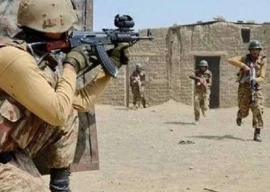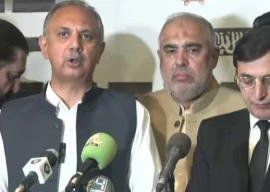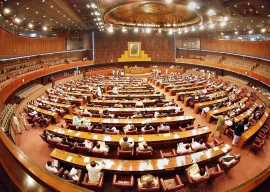
Most people know at least one individual who seems to suffer from a never-ending persecution complex.
This individual is convinced that everybody is out to get him and declines from reconsidering his opinion despite a heap of evidence to the contrary. He dreams up wild and fantastic conspiracies that others have plotted against him and interprets every action with deep suspicion. To substantiate his view, he believes there must be something about him that others are jealous of or desire to covet. Perhaps inevitably, he eventually becomes incapable of civilised dealing. Others are forced to resort to confrontation, avoidance or desertion. Vain to the last, he refuses to consider that something may be wrong with himself after all. He is not a bad person. He is simply incapable of one thing: critical self-reflection.
According to Dr Mubarik Haider, this is precisely the ailment Pakistan is suffering from. He presented his diagnosis at a lecture titled “Pakistan: A State on the Crossroads: Causes and Effects” arranged by Pakistan Writer’s Association in collaboration with Radio Power99 and Radio News Network on Friday.
It is hard to disagree with him. After all, is not the entire world out to raze Pakistan to the ground? Aren’t conspiracy theories as ubiquitous as mosquitoes in our country? Does Pakistan not hold the keys to the universe, in whose destruction lays the great joy of the evil and depraved world? Aren’t those who try to show us the mirror simply foreign agents or traitors, guilty of intellectual terrorism and worthy only of being disowned? If the answer to all these questions is in the affirmative, then perhaps it is time to admit our narcissism.
In Dr Haider’s view, Pakistan exhibits all the symptoms of a schizophrenic society embroiled in innumerable conflicts.
He said it was deplorable that our state institutions carried out their functions under a miasma of mutual mistrust and suspicion. He did not spare the rod to political, religious and media organisations either, accusing them all of further fomenting a culture of conflict and paranoia by irresponsibly perpetuating myths about the world. In his view, “the model of reality proposed by these groups is itself based on falsehoods, which cannot possibly produce realistic solutions.”
To illustrate the point, he said, “Suppose I see water seepage on my room’s wall. If I have modelled reality correctly, I will immediately assume the water is coming from a leaking pipe or tap. If I have modelled reality incorrectly, then I may even imagine that the water is coming from a nearby dam. This will, of course, decide how I choose to deal with the problem.”
But, he added, correctly modelling reality is not enough. One also has to resolve the problem in “real time”. “If action is delayed, the leaking water will continue to run and spread out and may eventually cause irreparable ruin,” he added. He said it was this ability to act in “real time” that gave human beings a greater survival edge over other animals.
He urged Pakistanis to escape from their state of denial and consider that perhaps the West was not so “jahil for its scientific progress and maybe most of the world’s current revulsion toward Pakistan was based on good reasons, instead of it being the result of a vast Zionist conspiracy.”
Potent advice indeed.
Published in The Express Tribune, March 20th, 2011.










1726140338-01730723472-0/Untitled-design-(42)1726140338-01730723472-0-270x192.webp)




1730706072-0/Copy-of-Untitled-(2)1730706072-0-270x192.webp)
COMMENTS (12)
Comments are moderated and generally will be posted if they are on-topic and not abusive.
For more information, please see our Comments FAQ